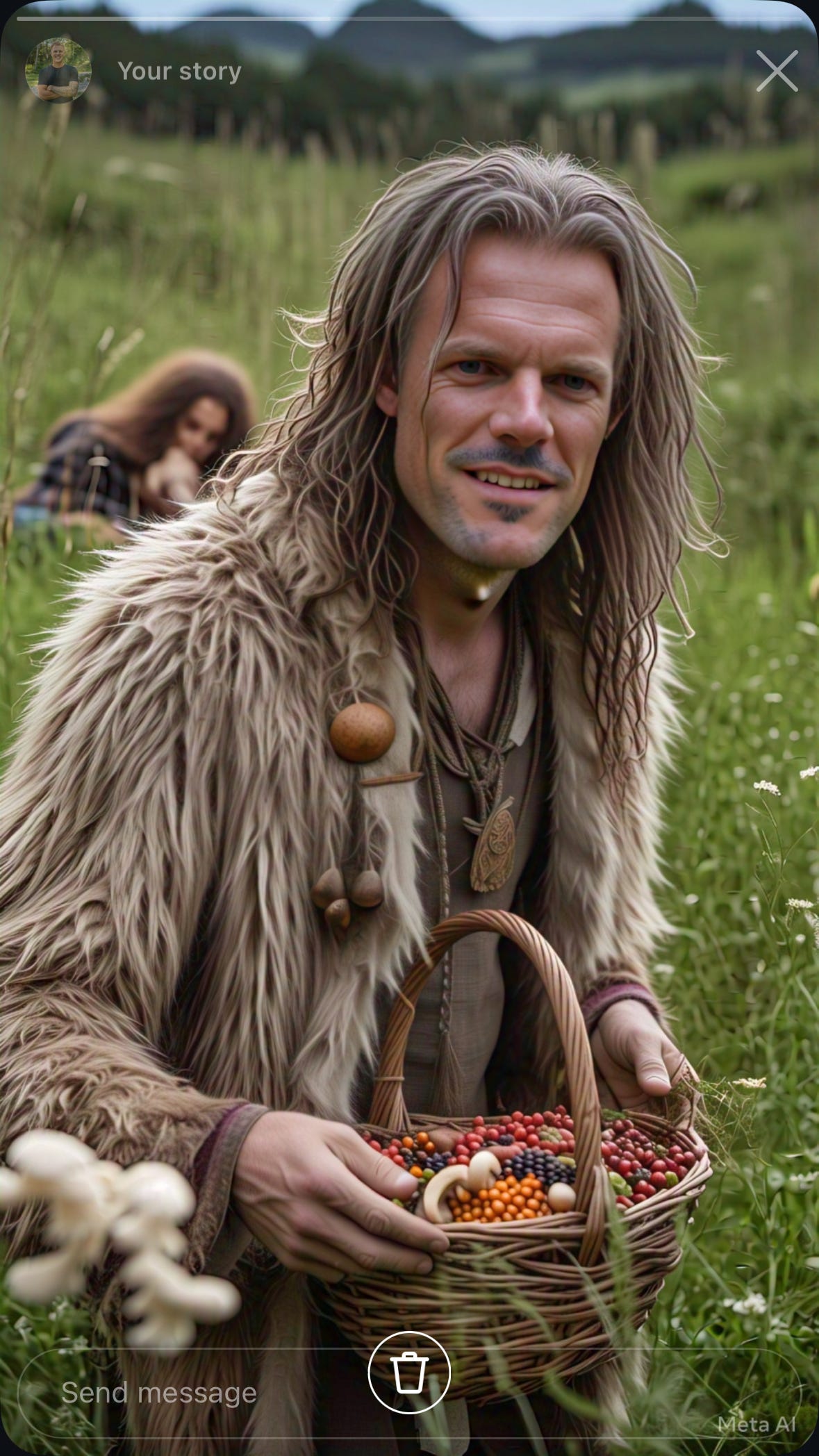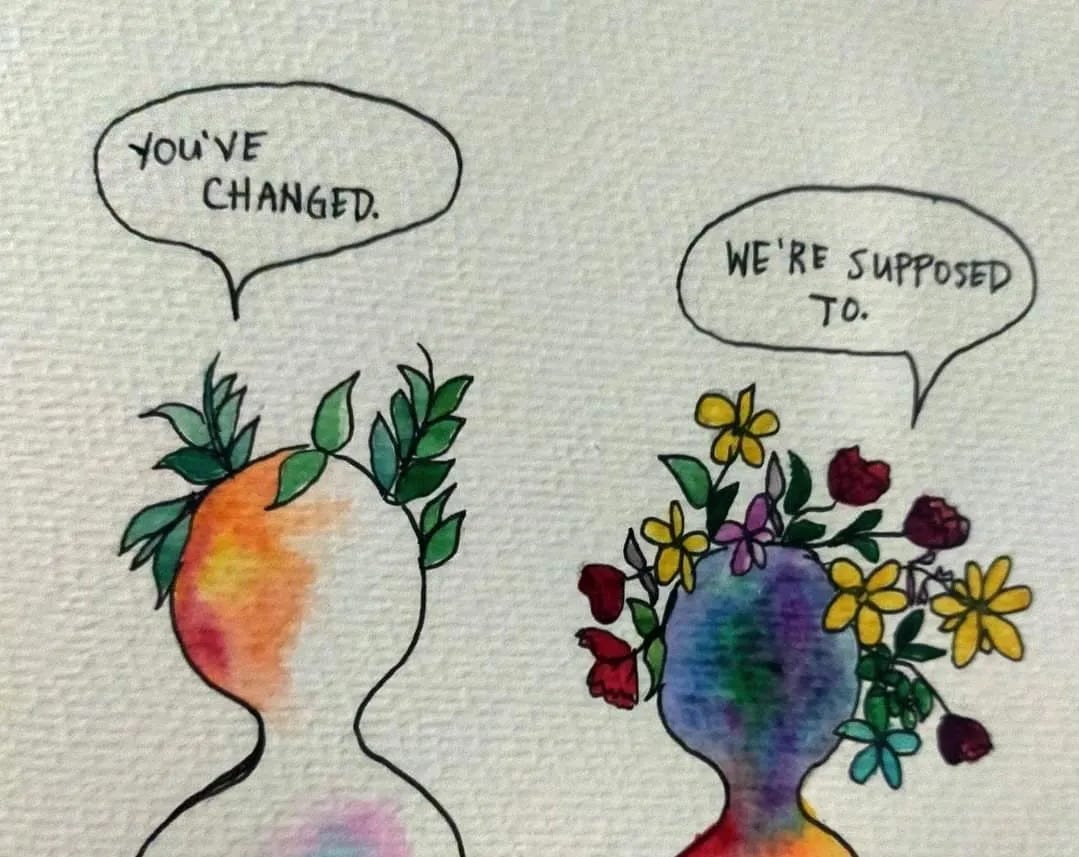We reward certainty. Political pundits, pastors, CEOs — the ones who "stick to their guns" get the airtime. In fact, politicians get crucified if they change their stance on something from a decade ago. “How DARE you change your mind?!”
American culture says, "Be consistent. Be convicted. Be unshakeable." Changing your mind is seen as a liability, unpredictability, a lack of backbone, a sign you didn’t know what you were talking about in the first place.
But what if changing our minds is the most human thing we can do?
We evolved by changing our minds. Anthropologically speaking, our survival depended on it. Early humans adapted to their environments by learning new tools, new patterns of cooperation, and new beliefs about the world around them. Daily. Perhaps hourly.
“We now can surely conclude: This food. This NOT food. Ugga, ugga.”
(Hey, Meta — generate an image of me as a caveman gathering berries and mushrooms.)
In our earliest days, mental flexibility wasn’t a luxury — it was a matter of life and death. As Harvard psychologist Steven Pinker notes, our brains are wired to update based on evidence; it's how we made it out of the caves and into civilization.
Every adaptation that brought us here was a response to something new.
So why do we treat intellectual, emotional, political or spiritual growth like a betrayal of who we once were?
As Brené Brown said, “I am not here to BE right, I am here to GET IT right.” That journey implies movement. Change. Evolution. If you’re doing it right, your beliefs should be less like stone tablets and more like river rocks — smoothed and reshaped by the flow of experience over time. Moveable. Stackable. Sometimes even abandonable.
Over the last five years, I’ve changed my mind about a lot.
I’ve changed my mind about spirituality.
I used to believe that truth came wrapped in a specific theology, inside a specific building, spoken in a specific language. But now I see all religions and belief systems as fingers pointing to the moon. They are not the moon. They are not the “thing” itself. They are metaphors. Maps. Invitations. Truth doesn’t belong to any one brand or book or tribe. “It’s all truth from the same truth tree,” as Pete Holmes would say. (Watch this clip of him and Neil Degrasse Tyson.)
“God is the name of the blanket we throw over the mystery to give it a shape.”
—Barry Taylor, road manager for AC/DC
I've changed my mind about politics.
I used to be a card-carrying member of the uber progressive, far left. But the more I stood back from the fray to observe, the more I saw that fundamentalism exists on all sides. Certainty — without humility — is always dangerous. Pete Enns calls it the “sin of certainty.”
People who have zero doubt are the types of people willing to strap a bomb to their chest and walk into a crowd. Fundamentalism is dangerous, no matter if you're far right or far left. Third way thinking is the only way forward. We need more bridge-builders. More people willing to say, "I see your point. And here’s mine. Can we sit with this tension for a while and work out a third-way path forward?"
I’ve changed my mind about my business.
Back in 2014, I dreamed of a sleek agency in a major city — 50 employees, household name clients, the whole shebang. But then I started to see the cost. The trade-offs. The diminishing returns. Twice-the-size business doesn’t mean twice-the-profit. It’s twice the stress. Twice the payroll. Twice the pressure. More problems to solve. And less time for the life I actually want to live.
Then I went to the Conscious Capitalism CEO Summit, described my business to someone, and they smiled and said, "Ah, so Emery is a lifestyle business?”
At first, I felt embarrassed. Like it was a cute little hobby instead of a "real" company. But then I sat with it. A business that supports my life, instead of swallowing it whole? Yes. That’s the point. I don’t want to build something I feel imprisoned by, as many entrepreneurs do.
I’ve changed my mind about solitude.
As an extrovert, I used to avoid quietude like the plague. I saw silence as absence. Now I see it as presence. I’ve found deep joy in yoga, meditation, mid-day walks, sauna, naps, spontaneous songs, and making art that no one will ever see. Things that don’t make money or move the needle, but feed a different kind of hunger. I’m still energized by people. Obviously. (Hell, I’m using my quiet time to write this to connect with you guys asynchronously.) But there was another garden within me that needed watering that I had neglected for the first 30 years of life. And it’s finally beginning to bloom.
I’ve changed my mind about psychedelics.
I used to believe MDMA burned a hole in your brain, and that psilocybin and LSD dropped your IQ. (Probably because that’s what D.A.R.E. taught me.) But as I’ve learned from pioneers like Michael Pollan — and experienced first-hand in safe, professionally facilitated psychedelic therapy retreats — I’ve come home clearer, calmer, and more connected. No loss of intellect. No brain fog. Just a deeper capacity for presence, empathy, and reflection. It’s not for everyone, that’s for sure. But it’s brought beauty and breakthrough into my life. And I’m so glad I changed my mind about it.
I’ve changed my mind about parenting.
I used to think I needed to be a perfect example — calm, wise, consistent, always saying and doing the right thing. But over time, I’ve realized that’s not what our kids need. What they simply need is presence. My friend Jed Mullenix has a parenting phrase I love: “Present over perfect.” That’s it. That’s the whole game.
Our children don’t need flawless parents. They need real ones. Ones who can model what it looks like to feel something crunchy and recover. To apologize when they screw up. To shift back into play after an hard moment.
The other day, Avi was sulking while Lily and I were throwing a frisbee in the driveway. We had invited him to join us ten different times. He refused. As he slunked away, Lily turned to me and said, “Please don’t let that ruin your time with me.” She’s already learning the unspoken truth: that parents tend to only be as happy as their least happy child. And maybe that’s part of the work too — remembering to stay present with what’s good, even when one of your kids is having a hard day. Not abandoning joy out of guilt. Not forcing a fix. Just being there. For the highs and lows, with quick shifts between them.
To change your mind is not to be weak or flaky or inconsistent. It is to be human.
It means you're paying attention. It means you’re not so married to your ego that you can’t see a better way. It means you are still growing.
So next time someone says you’ve changed, say thank you.
Because staying the same simply for “certainty’s sake” is a strange hill to die on.
-john








John - this is great advice for each of us as we grow and learn and are open to different ideas. Yet, this is a continual process, not a finite place to attain. If you are willing, your perspectives will constantly evolve as your vision of the world becomes wider and deeper. A book I have read by Anthony Pompliano - How to Live an Extraordinary Life - has one of the first guidelines as:
“NEVER FORGET - CARVE YOUR ETHICS IN STONE AND WRITE YOUR OPINIONS IN SAND.
I wish you the strength to do this daily.
The smartest people I know:
1. Obsessively read books.
2. Pursue new mental models.
3. Enjoy intelligent discourse.
4. Quickly admit when they’re wrong.
5. Are comfortable changing their opinion.
6. Surround themselves with intelligence.
7. Seek to understand every perspective on a topic.”
HERE IS TO A SOLID FOUNDATION AND AN EVER SEEKING AND LEARNING SPIRIT…LOVE YOU
Man, this is so good. The Sin of Certainty shaped me tremendously. I’ve found, as I close in on 30, much more freedom in the idealogical flexibility I lacked in my 20’s. I pray my kids benefit from a father who’s willing to have his mind changed.